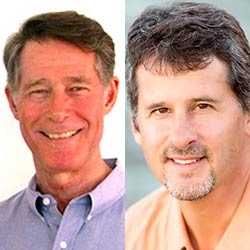
Search Results: trust
-
In this dynamic 4 session telecourse recording, Kelly Bryson provides practical skills to balance passion for self with compassion for others. You will learn to apply Nonviolent Communication to stop yourself from being intimidated, giving in or giving up, abandoning your own needs or resenting others.
-
Do you yearn to step forward in leadership, but know you're holding back? Clinical psychologist, organizational consultant, and speaker, Roxy Manning, PhD, shows us that more than external factors, its our internal beliefs and fears that provide the main barrier to moving forward. She does this by taking us through three myths of leadership, and weaves in anecdotes to illustrate how tapping our unique (often lesser recognized) qualities, can be the way forward we've been seeking. Learn ways to move forward, even if at first it appears that (1.) others can "do it better", (2.) you need to be more prepared, or even if (3.) the material you're conveying isn't so original (and has been used many times).
-
We invite you to dive into this voyage, where you and Robert will swim ever deeper into the Spiral of Life, coming face-to-face with your divine Life Force – that essential living energy that permeates all.
-
Your needs and your values are your Life Force: the river that flows through your spirit and your life, giving life and light to your being. Explore this river with Robert, and map out routes that support your growth. Gain a deeper understadning and acceptance of the spirituality and beauty of needs and values.
-
We're more likely to sacrifice trust, connection, and relationship quality when (1.) We use NVC to focus on being seen, understood, heard, or meeting our own needs in a way that eclipses our view and understanding of others needs; (2.) We don't clearly examine our intentions; and (3.) We use the NVC form so rigidly that it becomes difficult for others to connect with us authentically.
-
Old emotional hurts and pains can easily erupt when you’re in the throes of conflict – even if you’re the mediator. Wouldn’t it be lovely if you could avoid all of that, and instead create more peace and happiness for yourself, your family, your co-workers and your community?
-
Watch Jim and Jori Manske in this video as they share three key learnings about collaborating effectively.
-
Ask the Trainer: Can all needs be met when illness limits the capacity of one person to meet the needs of her partner?
-
Listen to three interwoven tales of love, vulnerability, courage and healing by CNVC Certified Trainer and Storyteller Leo Sofer.
-
Do you crave greater intimacy with your partner? Wish you had more ease for asking for what you want? Join relationship expert, Kelly Bryson in learning practical tips for building intimacy with your partner.
-
Conflict occurs when disagreements undermine the sense of trust and safety in family, workplace, or community. Shantigarbha shares nine tips for addressing, and even transforming conflict.
-
There are three things you can do to sort inner conflict and make doable, sustainable agreements with yourself. This capacity can build trust with yourself to follow through, and to develop diverse and creative solutions -- thereby increasing confidence and ease.
-
To tell the difference between empathy and investigation, watch for distinctions along four different dimensions: energy, subject, intention and trust. These distinctions can help us engage awareness and skill to meet your needs and respond to others’ needs in more direct ways. The more you meet your needs in conscious and direct ways, the more present you can be for others. Read on for more about how to do this.
-
Ingrid shares about the three primary keys of parenting & NVC, two child rearing models, developmental needs for children and how to foster secure attachment.
-
Sometimes we want to avoid placing our love and trust in someone, to protect our hearts and our life energies. And so there are deeper questions that we can use to check whether we're in relationship with someone who doesn't have capacity to be in relationship with us (eg. “Do I have a sense of mattering in this relationship?”). Read on for more questions we use to assess our empathy and efforts in relationships.
-
Interrupt cycles of conflict by creating a new ways forward. You can do this by connecting with the energy of the met needs you want in the dynamic; guessing the other person's needs; naming your needs; asking essential questions; identifying at least three different strategies to meet each need; and imagining the positive outcome.
-
Before you make a request you can connect fully to a time when your need was met. Notice how your request feels and sounds different from this place of aliveness. Excitement about meeting a need implies confidence and trust about moving forward together. Offer an invitation to find strategies that work for both of you.
-
Trust, flow, information sharing, and learning is reduced in conflict. Conflict can indicate incapacity in at least one of five systems that every group, community, or organization needs to function. Attending to conflict at systems-level helps reduce over relying on momentary connection that isn’t anchored in decisions about what comes next. When there's enough agreed upon systems within capacity, that attend to enough kinds of situations, we're likely to have little conflict.
-
When people get hurt or harmed, how can we restore trust, safety and connection in the community? A restorative approach which focuses on who got hurt and how can we restore it? Rather than whose fault is it and how can we punish them?
-
Every interaction with children contains messages about who they are, who we are, and what life is like. By engaging attachment parenting and NVC we give them rare gifts in society: to know their parents well, to discover the effects of their actions without being blamed for them, and to experience the power of contributing to meeting others' needs, and the power to move towards mutually satisfying outcomes.





















